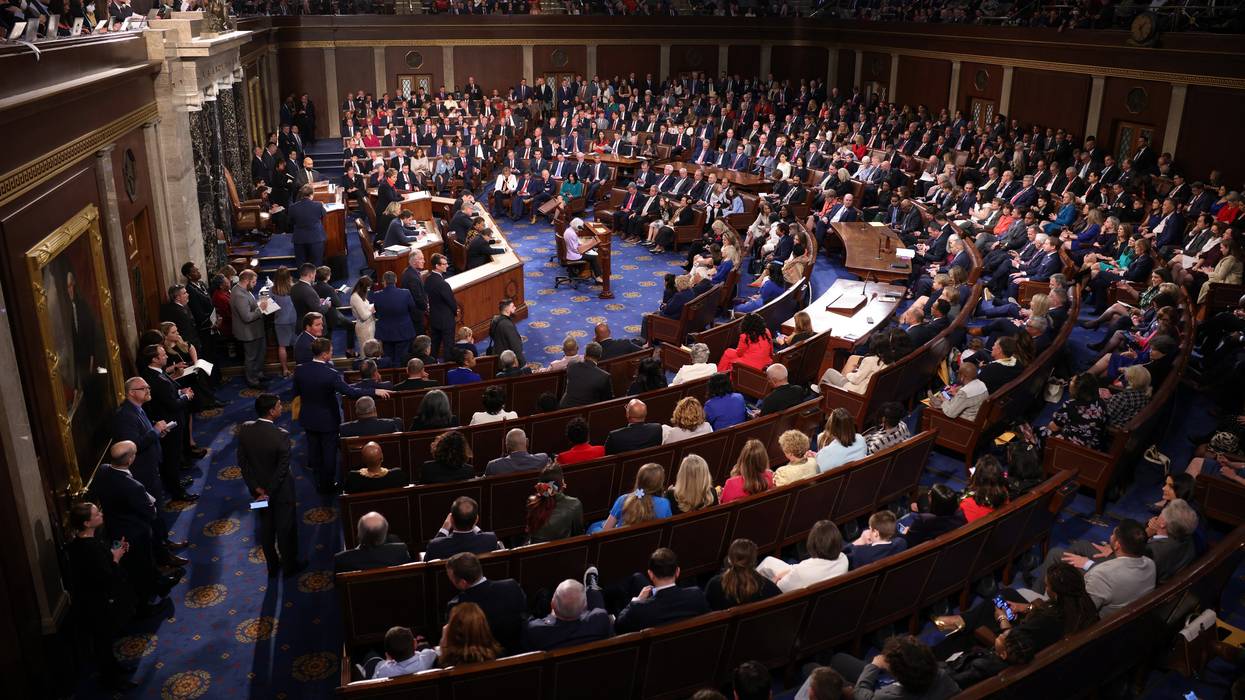Rep. Kevin Hern (R-Okla.), the leader of the Republican Study Committee (RSC), told the
Post that Congress has "no choice but to make hard decisions" even as experts dispute the GOP narrative that Social Security is in crisis.
Last year, the RSC suggested several possible changes to Social Security, including partial privatization and gradually raising the "full retirement age" from 67 to 70.
Rep. Rick Allen (R-Ga.), a supporter of raising the retirement age, claimed earlier this month that people "actually want to work longer."
"MAGA extremists in Congress are eager to use the debt they exacerbated with tax breaks for wealthy corporations as an excuse to threaten the health and retirement security of millions of hard-working Americans," Liz Zelnick, director of the Economic Security and Corporate Power Program at Accountable.US, said in a statement Tuesday. "It says it all about the MAGA majority fringe economic plan: Deep cuts to earned benefits for seniors and working people while protecting or even expanding wasteful tax breaks for billionaires and giant corporations."
"For nearly nine decades, Social Security has kept generations of seniors and Americans with disabilities out of poverty and allowed seniors to live out their Golden Years with dignity," Zelnick added. "For nearly 60 years, Medicare has provided millions of seniors with access to life-improving health benefits no matter their income or condition. MAGA extremists want to break the promise of guaranteed benefits that has been kept for generations—benefits earned through years of hard work—rather than ask for any contribution from their biggest and wealthiest donors, especially greedy corporations."
"Today, a billionaire pays the same amount into Social Security as someone making $160,000 a year."
Due to soaring income inequality, a
rising share of rich people's earnings has not been subject to Social Security payroll taxes, which didn't apply to any wage income above $147,000 in 2022. Because of that $147,000 cap, millionaires stopped paying into Social Security on February 24 of last year.
Over the weekend, Sen. Bernie Sanders (I-Vt.)
said he plans to reintroduce his legislation that would "extend Social Security's solvency for the next 75 years and expand benefits by $2,400 a year" by lifting the payroll tax cap.
"Today, a billionaire pays the same amount into Social Security as someone making $160,000 a year," Sanders wrote on Twitter. "Let's end that absurdity."
But scrapping the payroll tax cap is not among the changes that House Republicans have floated in recent weeks as they threaten
another round of debt ceiling brinkmanship.
As the
Post noted Tuesday, the RSC proposal released last year raised the "possibility that lawmakers could rethink payroll taxes, allowing the money to fund private-sector retirement options."
Republicans and one Democrat—
Sen. Joe Manchin of West Virginia—have also spoken favorably of the TRUST Act, a bill led by Sen. Mitt Romney (R-Utah) that would establish bipartisan committees to craft "legislation that restores solvency and otherwise improves" the nation's trust funds, including Social Security.
"The idea could gain some traction in the House, where [Rep. Vern Buchanan (R-Fla.)] pointed to the bill as he stressed the need to 'work together and not make this so political,'" the
Post reported Tuesday. "Another top Republican, Rep. Jodey Arrington (R-Texas), led a group of Democratic and GOP lawmakers two years ago in calling for 'special, bipartisan, bicameral rescue committees' to study Social Security, Medicare, and other federal trust funds."
While many House Republicans gun for cuts and other regressive changes to Social Security, Sens. Bill Cassidy (R-La.) and Angus King (I-Maine) are working on legislation that "would see the federal government create a new fund with borrowed money, which it would invest in stocks to cover future retirement benefits,"
Semafor reported last week.
"That maneuver is designed to cash in on the higher returns that equities usually earn compared to the Treasury bonds that Social Security’s current trust fund invests in," the outlet explained.
The American Prospect's Ryan Cooper welcomed the idea as "splendid and long-overdue" but acknowledged that something like the TRUST Act "probably has a better political chance of success than Cassidy and King’s more fair and technically competent approach."
"Official Washington prefers elite politicians making 'hard choices' to slash benefits for seniors on fixed incomes," Cooper wrote in a column on Monday. "But a social wealth fund is an idea worth underlining."
President
Joe Biden and congressional Democrats have vowed to oppose any GOP push for Social Security cuts, demanding clean legislation to raise the debt ceiling and avert an economic disaster.
“Republicans won a majority in the House and they’re allowed to advocate for their priorities, but it is unacceptable to take American families and the economy hostage in this way," Sen. Ron Wyden (D-Ore.), chair of the Senate Finance Committee,
said in a statement last week. "Democrats will not entertain these threats from Republicans, particularly to Medicare and Social Security. Republicans must stand down on the debt limit immediately."
Rep. Mark Pocan (D-Wis.), chair emeritus of the Congressional Progressive Caucus,
wrote on Twitter Tuesday that "Medicare and Social Security are non-negotiable."
"Americans work hard and contribute to these programs with every paycheck," Pocan added. "Republicans raised the debt ceiling three times under Trump. Risking default or robbing seniors of hard-earned benefits are not options."




